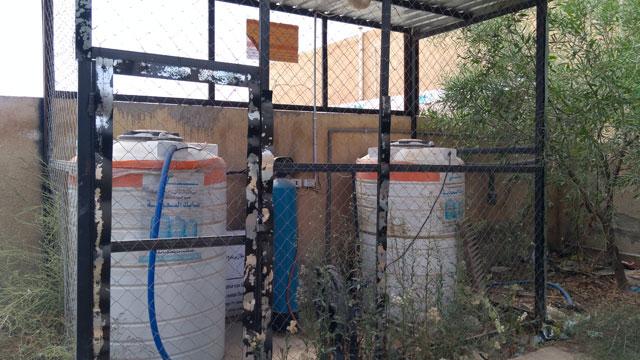You are here
Rural Family Society wins int’l award for greywater project
By Hana Namrouqa - Sep 18,2017 - Last updated at Sep 20,2017

The system installed in the school’s backyard receives the greywater, treats it and then pumps it to irrigate the school’s garden (Photo courtesy of Mohammad Jaber)
AMMAN — In a desert town infamous for its environmental adversities, a public school for girls is hosting a project that has won an international award for setting a strong example in using alternative water resources for irrigation and reusing water for sustainable sanitation.
In Dulail Municipality, some 50 kilometres east of Amman, the schoolgirls spend their midday break sitting in the shade of indigenous trees that are irrigated by the greywater their school generates.
The small system installed in the school’s backyard receives the greywater, treats it and then pumps it to irrigate the garden.
The initiative has won the Sustainable Sanitation Alliance’s (SuSanA) prize held as part of the Stockholm World Water Week 2017 for setting up a learning case and an upscale model throughout the Middle East and North Africa region.
The Rural Family Society (RFS), a newly established NGO based in the Azraq Municipality, installed the system at the school under its Youth Participation in Local Environmental Development in the Eastern Desert Project.
The project entailed training over 70 youth from Dulail and Azraq municipalities, two eastern desert towns with substantial environmental challenges, on environmental advocacy, fundraising, communication, proposal writing, environmental entrepreneurship and networking with environmental institutions, RFS founder, Omar Shoshan, said.
The environmental training targeted youth in Dulail and Azraq which both suffer from environmental problems; they also have great potential for becoming leaders in environmental advocacy, Shoshan said.
Dulail is one of the country’s environmental hotspots since it is home to many industries, qualified industrial zones as well as cattle and poultry farms, while Azraq, 100 kilometres east of Amman, is home to two of Jordan’s renowned nature reserves, Shoshan pointed out.
“Several training workshops were held over the past year for youth of the eastern desert, after which they were divided into groups and requested to come up with projects which they believe can uplift their communities’ environmental awareness and improve living conditions,” Shoshan told The Jordan Times.
The trainees implemented four projects including creating a garden at a school, recycling paper produced at schools, being guide to bird watching in Azraq and installing a greywater treatment system, which has won the SuSanA Sustainable Sanitation Project Prize.
Mohammad Jaber, a participant in the Youth Participation in Local Environmental Development in the Eastern Desert Project, said that the project empowers the young generation to launch grassroots environmental initiatives.
The young man was part of the group which implemented the greywater treatment system at the girls school in Dulail.
“In parallel to installing the system and creating a garden as a breathing space for the girls, our group conducted environmental training for the students on climate change, water scarcity and importance of water reuse and conservation, among other topics,” Jaber told The Jordan Times.
Jaber, who is a lecturer at the Hashemite University’s water and environment management department, said that several schools in Dulail showed keenness on installing a similar greywater treatment system after seeing its functionality and benefits to the school and the students.
In Azraq, a project for recycling paper, cardboard and books produced by schools distributed recycling bins to collect wastepaper.
Mays Bassar, another young participant in RFS’ environmental training programme, said that her group’s initiative aimed at introducing the concept of recycling to school children, reducing the amount of waste reaching landfills, creating job opportunities and highlighting the investment potential of waste.
“We came up with the project because tonnes of paper are generated from schools and taken as waste to landfills when they can become a small investment if managed in a way that protects the elements of nature and also create jobs,” Bassar, an agricultural engineer specialised in water and environment management, told The Jordan Times.
Related Articles
AMMAN — Azraq is a small town in northeastern Jordan characterised by hot, arid summers and cold, dry winters.
AMMAN — Being one of the driest countries in the world, Jordan faces many pressing environmental difficulties.Water scarcity affects every a
AMMAN — Three mosques categorised as large water consumers will be turned into “examples of water efficiency” under a new project to reduce
















